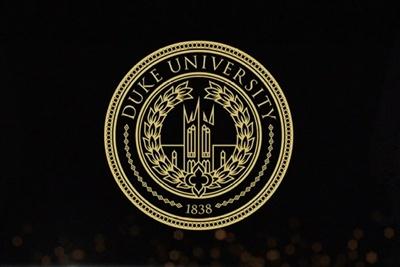
The School of Medicine faculty and staff were among the recipients of Duke University’s prestigious 2020 Presidential Awards, which recognizes individuals and teams from the University and Health System who best demonstrate the values that define and shape Duke as an institution: respect, inclusion, excellence, trust and discovery.
The awards are the highest honor given by Duke to staff and faculty members. Many of this year’s winners helped Duke rise to the challenge of the COVID-19 pandemic and the difficult national dialogue on race and social justice.
“I am delighted to congratulate this year’s Presidential Award winners, who were selected from our most competitive ever field of nominees,” said Duke University President Vincent E. Price. “Over the past year, we have faced unprecedented challenges as a community, and the leadership of these awardees has helped keep us safe, healthy, and engaged—and on course toward a more inclusive and vibrant future for Duke. We can all be proud to call them colleagues.”
“I am incredibly grateful to our faculty, staff and students for their sacrifices, commitment and contributions during the past year,” said Mary E. Klotman, MD, Dean, Duke University School of Medicine. “They have embraced two important goals throughout this pandemic: to lead and contribute to the response against COVID-19 and to minimize the spread of the virus among our faculty, staff, students, and in our community. Congratulations to all of these most-deserving recipients of the Presidential Awards.”
Recipients from the School of Medicine include:
Duke Human Vaccine Institute
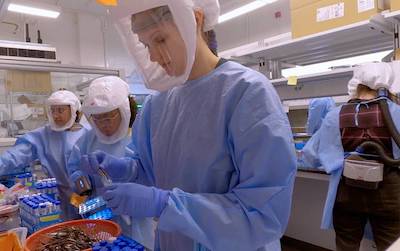
Since 1990, the Duke Human Vaccine Institute (DHVI) has been a leader in developing vaccines and treatments for infectious diseases. From the earliest days of the COVID-19 pandemic, the DHVI team played a key role in Duke’s response. DHVI researchers studied the virus and began work to develop a vaccine and countermeasures. The DHVI’s Regional Biocontainment Laboratory team trained hospital workers of the use of protective equipment and helped establish methods for researchers to safely study the virus. The DHVI’s lab overseen by Tom Denny developed an in-house test processing method that allowed the university’s surveillance testing system to keep a close watch on COVID-19’s effect on campus and respond in real-time to minimize the spread of the virus.
“The DHVI team has performed outstanding clinical and translational research, and with incredible efforts of testing, has helped to keep the campus safe,” Duke University School of Medicine Dean Mary Klotman, wrote in her nomination for the awards.
LATIN-19 Team
Early on during the COVID-19 pandemic, Duke faculty members helped convened the Latinx Advocacy Team & Interdisciplinary Network for COVID-19 (LATIN-19). Made of 56 volunteer members drawn from Duke University and Duke Health system and other community organizations, and with backgrounds in health care, public policy, education, business and community activism, the group worked to identify and remedy pandemic-related disparities facing the Latinx population. The group helped improve access to testing, contact tracing and care for the Latinx community, increased the amount of Spanish language COVID-19 information available, and guided state and local policy changes. All of these steps helped reduce the infection rate among Durham’s Latinx community.
“Every aspect of this group has been extraordinary,” said Duke University School of Medicine Dean Mary Klotman. “They have taken their commitment to our community and turned it into action, filling huge gaps in providing support, advocacy, information and care for our Latinx community in North Carolina.”
DHTS Telehealth
When the COVID-19 pandemic began, it became clear that Duke would need to greatly expand its telehealth offerings in order to safely serve patients. Much of the work of quickly building and maintaining the infrastructure for comprehensive video visits was taken up by a 13-person team from Duke Health Technology Solutions.
The results of their work were hard to miss. In January of 2020, Duke health care providers conducted around 100 video visits. At the height of the pandemic, Duke conducted around 2,000 visits per day.
“The teamwork demonstrated by these cross functional and multi-disciplinary individuals was impressive, and it remains so,” write nominator Matt Roman, DHTS chief digital strategy officer. “This team has performed work that will be foundational to the growing digital health platform to better support the patients of Duke Health going forward.”
Duke Family Medicine
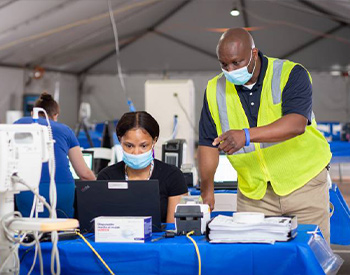
Duke Family Medicine played a central role in organizing Duke's COVID-19 testing operations. Photo by University Communications.
On March 13, 2020, a handful of Duke Family Medicine staff members tested the first Duke students for COVID-19. Months later, as thousands of Duke and Durham community members were tested in a large on-campus drive-through tent, the staff of Duke Family Medicine was still at the heart of the operation. In addition to learning and refining testing protocols, maintaining safety procedures and training other staff members helping with the effort, a core group of 23 Duke Family Medicine staff members played a pivotal role in tracking the spread of the virus.
“The pandemic has brought out the best in many of our health care teams across the Duke system,” wrote nominator Geri Wahlay, a clinical nurse with Duke Family Medicine. “It has allowed us the opportunity to step up and show the community at large the Duke values that we live every day. This team at Duke Family Medicine has been at the forefront of the outpatient response in helping Duke to not only take care of the patients, but the employees and students as well.”
Cameron Wolfe, MBBS, and Thomas Holland, MD

Thomas Holland, MD, a hospitalist and infectious disease physician, led in-patient clinical teams caring for COVID-19 patients while helping Duke’s other infectious disease experts better understand the challenge the virus posed. Meanwhile, Cameron Wolfe, MBBS, infectious disease expert, led Duke’s Biological and Emergency Preparedness team, offered his expertise to Duke’s vaccine distribution effort, helped design the Atlantic Coast Conference’s COVID-19 safety plans and became the reassuring face of Duke’s pandemic response to the community and world.
“Their efforts are having an impact locally at Duke Health as well as globally,” wrote Kathleen Cooney, MD, the George Barth Geller Distinguished Professor of Medicine Chair of the Department of Medicine and one of the pair’s nominators. “They represent the best of Duke Health and have worked tirelessly during the pandemic to directly address this public health crisis.”
Erin Wood, IT Analyst, Senior, Duke Cancer Institute Information Systems
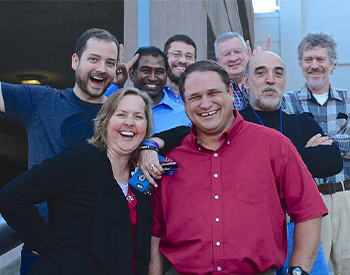
Erin Wood, front left, and her colleagues from the Duke Cancer Institute.
As a stage 4 colon cancer survivor, Erin Wood throws herself into the work of the Duke Cancer Institute, and her other roles as an advocate for colon cancer awareness and a sympathetic supporter of colon cancer patients.
While continuing to undergo treatment, she remains a dedicated and positive colleague for her teammates.
“Erin constantly shows an incredibly positive attitude and spirit, a dedication to Duke’s patients and staff, and has an intricate understanding of what the staff and patients need from the unique perspective she readily provides,” wrote nominator Geoffrey Chenger, Duke Cancer Institute Information Systems IT Manager. “Not only have I never heard her complain about any of this, she stays so positive that it is an inspiration to all of us. Her spirit reminds all of us why we are really coming to work today.”
John Anderson, MD, MPH, Chief Medical Officer of Duke Primary Care; Assistant Professor, Community and Family Medicine
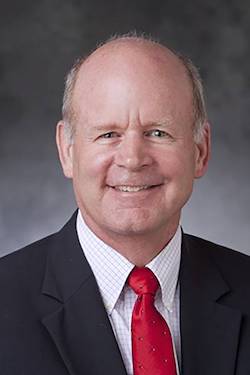
During his 35 years at Duke, John Anderson, MD, has demonstrated the value of collaboration and accountability. That came into focus during the COVID-19 pandemic when he gave his team the freedom to create innovative solutions to the unprecedented challenges the COVID-19 pandemic posed.
As a result, Duke Primary Care was able to quickly build systems to effectively and safely deliver testing and care to the wider community. He also kept the large Duke Primary Care team informed and inspired through regular online town hall meetings.
“Throughout his career and even more so during this pandemic, Dr. Anderson has demonstrated his leadership in his ability to tap on shoulders and be a strong proponent of raising up leaders,” write Duke Primary Care Physician Lisa Nadler, MD, one of Anderson’s nominators. “He frequently reminds us that it ‘takes a village’ with a continuous emphasis on teamwork and leading by example.”
Kafui Dzirasa, MD, PhD, Ranga Rama Krishnan Associate Professor of Psychiatry and Behavioral Sciences; Assistant Professor of Biomedical Engineering, Neurobiology and Neurosurgery
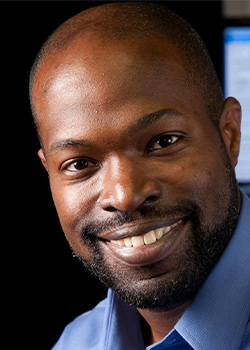
In addition to doing groundbreaking research using neuroscience, bioengineering and computational approaches to examine the roots of mental illness, Kafui Dzirasa, MD, PhD, is a tireless advocate for, and mentor to, underrepresented minorities in science and medicine.He’s worked to create a lab defined by inclusion and become a national voice on issues of racial inequality in science and academia.
“Dr. Dzirasa is a truly unique member of our community: a trailblazer, an innovator, a caring colleague, an activist, and an inspirational leader across many dimensions,” wrote Moira Rynn, MD, chair of Duke’s Department of Psychiatry & Behavioral Sciences and one of Dzirasa’s nominators. “He is a powerful force for positive growth and change at Duke, and his contributions make our institution—and the world—a better place.”